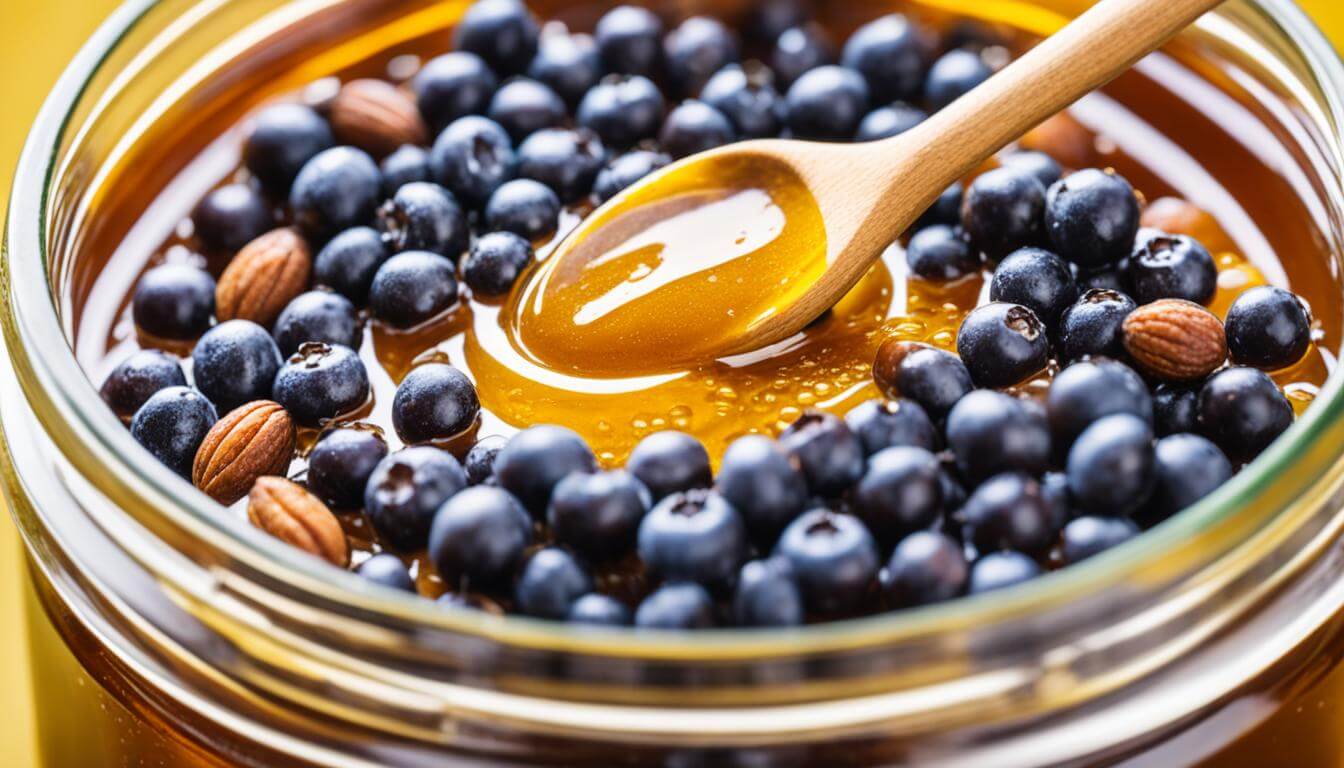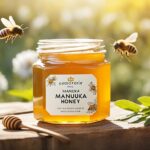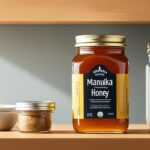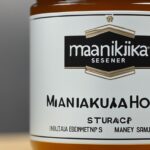More than just a sweetener, Manuka Honey harbors an elixir of wellness that challenges the very essence of traditional health remedies. Just what is it about Manuka Honey that summons such global adulation? Derived from the nectar of the Manuka bush (Leptospermum scoparium), a native gem to the terra firma of New Zealand and Australia, this honey is not just about its delectable taste. Often lauded for its Manuka Honey Benefits, the Nutritional Value of Manuka Honey extends far beyond your typical honey pot.
For centuries, honey has captivated our palates, but Manuka Honey takes it up a notch with its rich portfolio of health benefits. Secreting a treasure trove of essential vitamins, minerals, and bioactive compounds, Manuka Honey not only sweetens your day but imparts its Health Benefits of Honey each time it graces your tongue. Its Unique Properties set the stage for a profound dietary intervention. In our journey through the nectarous landscape of Manuka Honey, let the discovery of its golden health virtues begin.
What Sets Manuka Honey Apart?
Manuka honey, a natural elixir, springs forth with an abundance of distinct qualities that differentiate it from other forms of honey. One key attribute that truly makes it stand out is the Unique Manuka Factor (UMF), a measure considered the gold standard for grading the substance’s purity and potency, especially in terms of its antimicrobial properties. This captivating premium honey benefits from a convergence of various factors that champion its exclusivity.
The high UMF rating is a testament to the meticulous process ensuring that when you indulge in Manuka honey, you are consuming raw honey nutrition at its zenith. What contributes to this venerable rating is a mixture of the honey’s origin, the singular methods of harvesting, and the stringent standards maintained to preserve its nutritional integrity. Let us delve into the aspects that bestow Manuka honey with its peerless status.
- Geographical Origin: Sourced from the pristine wilds of New Zealand, Manuka honey owes its genesis to the nectar of the Leptospermum scoparium, or the Manuka bush. The remote, pollution-free environments are key to the honey’s untainted quality.
- Harvesting Practices: The harvest of Manuka honey is conducted with a commitment to sustainability and minimal intervention, ensuring the protection of the delicate ecosystems where the Manuka bushes flourish.
- Certification and Science: Achieving a UMF certification requires that the Manuka honey undergoes rigorous testing in independent laboratories to validate its authenticity and the strength of its healthful compounds.
Below is a comparison that illustrates how factors like UMF ratings influence the premium honey benefits one can expect from Manuka honey in contrast to regular variants.
| Quality Factor | Manuka Honey | Regular Honey |
|---|---|---|
| Unique Manuka Factor (UMF) | Rated from UMF 5+ to UMF 20+ | Not applicable |
| Origin | New Zealand’s native bush areas | Varied global locations |
| Antimicrobial Properties | High due to MGO component | Varies, generally lower |
| Raw Nutrition Content | Unadulterated and rich in nutrients | May vary depending on processing |
Embracing Manuka honey is to invest in a raw honey nutrition experience par excellence. It’s not just honey; it’s a commitment to wellness characterized by the Manuka Honey Distinct Qualities. As one of nature’s own luxurious bounties, it advertises not only sweet indulgence but a promise of health embellished by the storied lands of its origin and the meticulous care bestowed upon its crafting.
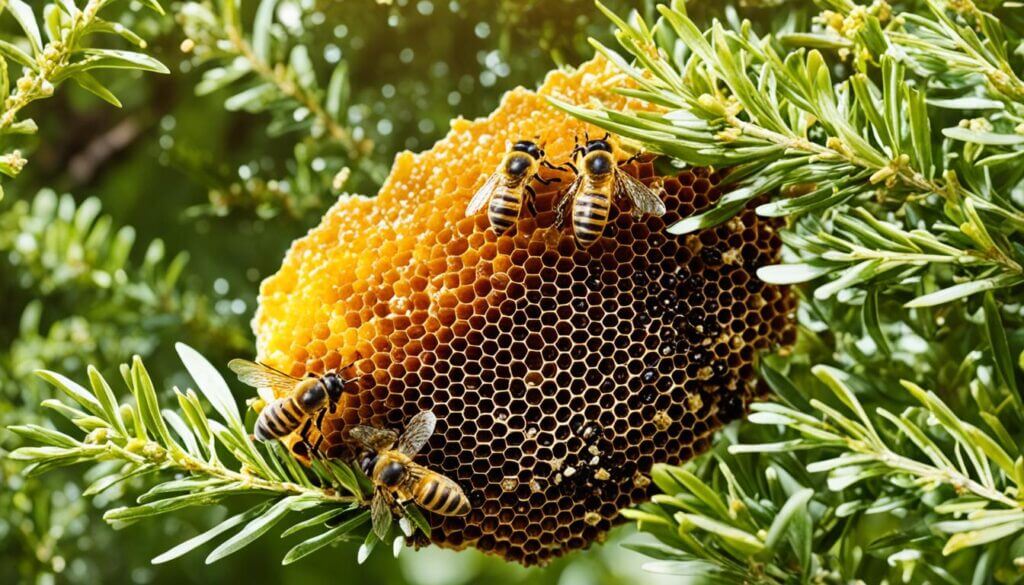
A Deep Dive into Manuka Honey Nutrition
The allure of Manuka honey lies not just in its rich, earthy taste but also in its impressive array of health-supporting nutrients. Packed with a myriad of Manuka Honey Nutrients, it goes beyond the ordinary, delivering Manuka Honey Health Properties that have captured the interest of health enthusiasts worldwide. From providing essential micro-nutrients in honey to offering natural sweetener benefits, Manuka honey is a formidable addition to a health-conscious diet.
Unveiling its nutritional prestige, Manuka honey contains beneficial compounds that support health and well-being. It is a treasure trove of natural sugars, vital minerals, and a spectrum of vitamins, which will now be detailed to appreciate their roles and contributions to our health.

| Nutrient | Benefit |
|---|---|
| Calcium | Supports bone health and cellular function |
| Magnesium | Essential for energy production and nervous system regulation |
| Potassium | Crucial for heart function and fluid balance |
| Vitamin B6 | Important for metabolism and brain health |
| Thiamine (Vitamin B1) | Helps convert nutrients into energy |
| Niacin (Vitamin B3) | Supports DNA repair and skin health |
| Riboflavin (Vitamin B2) | Vital for growth and red blood cell production |
| Amino Acids | Building blocks of proteins, influencing flavor and health benefits |
| Antioxidants | Reduces oxidative stress and inflammation |
Each of these components plays a unique role in fostering health, from facilitating muscular and neurological functions to bolstering the immune system. Effusively indulgent yet inherently nourishing, Manuka honey’s medley of natural goodies positions it as a sought-after superfood. Its versatile use as a potent nutritional adjunct cements Manuka honey’s place in both our pantries and our wellness routines.
The Mysterious Methylglyoxal (MGO) Factor
Within the realm of natural healing honey, the presence of MGO in Manuka Honey stands as a testament to its antibacterial prowess and exceptional potency. Methylglyoxal (MGO), a much-discussed organic compound, is recognized for granting Manuka Honey its remarkable antibacterial honey qualities. One can trace the origin of MGO to the dihydroxyacetone that is abundantly found in the nectar of the Manuka flower, emphasizing the unique bond between the flower and its byproduct.
The concentration of MGO in Manuka Honey not only informs us of its potential to combat bacteria but also serves as a crucial indicator of Manuka Honey potency. The higher the MGO content, the more formidable the honey is deemed in its therapeutic capacities. This inherent virtue is quantified and communicated to consumers through the UMF rating – a reliable measure of quality and efficacy.
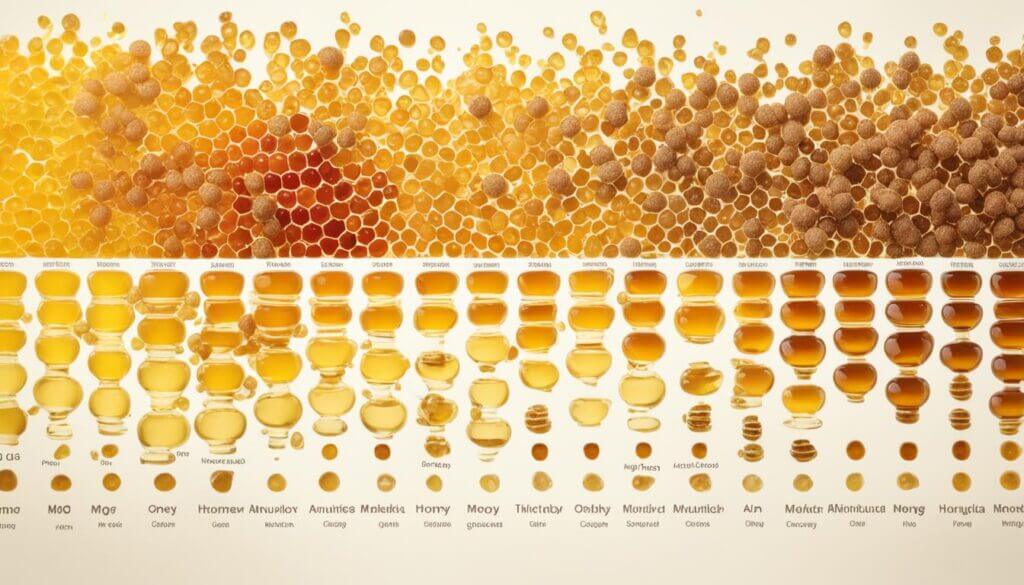
To further elucidate the relationship between MGO levels and the UMF rating, below is a table that provides insight into how these metrics align and interact:
| UMF Rating | Minimum MGO Level | Antibacterial Potency |
|---|---|---|
| UMF 5+ | 83 mg/kg | Basic |
| UMF 10+ | 263 mg/kg | Moderate |
| UMF 15+ | 514 mg/kg | Strong |
| UMF 20+ | 829 mg/kg | Extra Strong |
| UMF 25+ | 1200 mg/kg | Maximum |
Consumers seeking natural healing honey often gravitate towards higher UMF-rated Manuka Honey, acknowledging the superior levels of MGO and consequent health benefits. As the table illustrates, the greater the UMF, the more significant the concentration of MGO, and thus, the more powerful the antibacterial effect.
Through understanding the MGO factor, enthusiasts of this natural elixir can appreciate the profound efficacy of Manuka Honey. Its role in natural medicine continues to grow as more discover the profound benefits nestled within its viscous, golden depths.
Antioxidants in Manuka Honey: Nature’s Shield
Delving into the health-promoting elements of Manuka Honey, its robust antioxidant profile stands out, offering Manuka Honey Antioxidants that serve as a mighty ally in the body’s defense system. The antioxidants in Manuka Honey, such as the coveted flavonoids and phenolic acids, have been widely researched for their ability to provide formidable Honey Health Protection against oxidative stress – an imbalance of free radicals and antioxidants in the body. Antioxidants neutralize these free radicals, which, if unchecked, can contribute to chronic diseases.
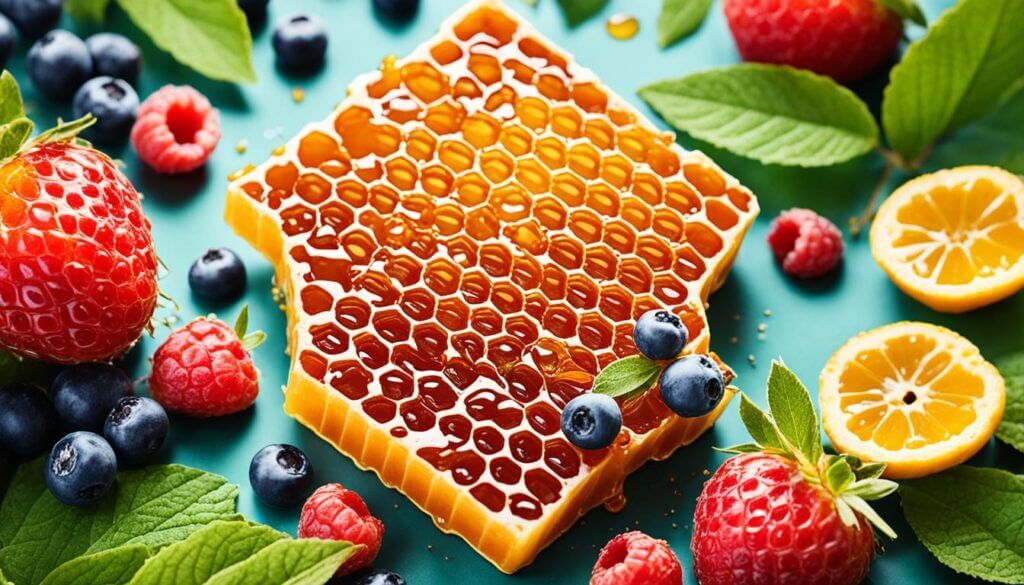
The Anti-Inflammatory Benefits of these natural compounds cannot be overstated. Chronic inflammation is a root cause of numerous health problems, but the anti-inflammatory properties of Manuka Honey work effectively to soothe and reduce inflammation, contributing to overall wellness. Moreover, the Immune-Boosting Honey properties of Manuka Honey do not merely end at its antioxidants; its complex composition also supports the immune system, making it a cherished staple in many health enthusiasts’ diets.
- Flavonoids in Manuka Honey have been recognized for their role in reducing inflammation and even possibly helping to prevent cancer.
- Phenolic acids, abundant in Manuka Honey, are potent antioxidants that contribute to the protection against cardiovascular diseases.
An increased intake of Manuka Honey’s antioxidants may offer significant health advantages, influencing conditions like cardiovascular disease, certain cancers, and other conditions where oxidative stress and inflammation are known to be underlying factors. Embracing the natural power of Manuka Honey can be a delicious and healthful addition to one’s diet aimed at fortifying the body’s innate defense mechanisms.
Manuka Honey’s Carbohydrate Composition for Energy
As a natural energy source, Manuka honey stands out due to its substantial carbohydrate content, primarily comprising fructose and glucose in honey. These naturally-occurring sugars are known for their efficiency in providing a swift source of energy, which is easily assimilated by the body. Particularly for those requiring sustained energy foods, such as athletes or individuals with demanding lifestyles, Manuka honey emerges as a nutritional powerhouse.
Manuka honey’s carbohydrates serve as a cleaner alternative to processed sugars and artificial sweeteners. The rapid metabolism of these honey carbohydrates translates into instant energy, aiding endurance and performance while also sustaining energy levels over a period of time.
- Quick Energy Uptake: The simple sugars are rapidly absorbed into the bloodstream, offering an immediate energy lift.
- Endurance Support: With a lower glycemic index than many refined sugars, Manuka honey provides a steady release of energy.
- Convenient Fuel: Manuka honey can be consumed directly or incorporated into a variety of recipes, making it an adaptable energy source throughout the day.
A unique aspect of Manuka honey is how its energy-yielding carbohydrates, namely fructose and glucose, maintain a balance that can have a positive effect on blood sugar levels when consumed in moderation. It’s a key feature that differentiates it from other sweeteners which may cause more drastic spikes and drops in blood sugar levels.
| Energy Source | Benefits of Manuka Honey |
|---|---|
| Fructose and Glucose Ratio | Optimal balance for sustained energy and easier digestion |
| Glycemic Index | Lower than many refined sugars, allowing for a more moderated blood sugar response |
| Versatility | Easily integrated into meals and snacks without the need for additional sweetening agents |
It is clear that Manuka honey isn’t just another sweetener; it’s a natural alternative that’s packed with energy-yielding carbohydrates and has the potential to support healthier lifestyle choices. Whether it’s through a pre-workout snack, a midday energy booster, or a sweet addition to a balanced meal, the role of Manuka honey in enhancing one’s nutrition and energy levels cannot be overstated.
The Role of Amino Acids in Manuka Honey
Manuka honey, a superfood with a rich and intricate nutritional profile, is not only a sweet treat but also a source of essential nutrients. Among these nutrients are amino acids, the fundamental protein building blocks vital to human health. Amino acids in honey are more than just simple nutrients; they are also bioactive compounds that contribute to Manuka honey’s distinctive characteristics.
Amino acids serve countless functions, including acting as enzymes that catalyze biochemical reactions, structuring proteins that control DNA synthesis, and influencing the honey’s flavor profile. The significance of these nutrients lies in their role within our bodies – from muscle repair to immune system support. But what about essential amino acids? These are amino acids that the body itself cannot produce and must be derived from food. Manuka honey contains these life-sustaining compounds, albeit in small quantities, thereby contributing to its nutritional value.
Manuka honey’s rich content not only includes these protein building blocks but also presents with a complex array of natural benefits. Studies suggest that the presence of amino acids in honey, such as proline, can be associated with honey’s therapeutic quality, although more research is necessary to fully comprehend these effects. The table below lists some of the key amino acids found in Manuka honey, illustrating their importance within the Manuka Honey Nutritional Profile.
| Amino Acid | Role in Nutrition | Benefits for Health |
|---|---|---|
| Proline | Collagen production, protein synthesis | Supports skin health, wound healing |
| Lysine | Protein synthesis, hormone and enzyme production | Plays a role in immune function, calcium absorption |
| Valine | Muscle growth, tissue repair | Energy provision, supports mental vigour |
| Arginine | Nitric oxide production, detoxification | Improves circulation, stimulates immune response |
| Tryptophan | Niacin synthesis, serotonin production | Regulates mood, sleep, and appetite |
One can clearly see that the presence of these essential amino acids in Manuka honey, though in smaller concentrations compared to other food sources, still adds to the overall dietary impact Manuka honey can have. With its combination of sweet flavor and the power-packed Manuka Honey Nutritional Profile, it’s a natural choice for those looking to enrich their diet with a touch of nature’s best.
Manuka honey goes beyond being just a dollop of sweetness; it’s a symphony of healthful delights, host to numerous beneficial substances. Its comprehensive nutritional profile, which includes protein building blocks, turns it into more than just a condiment – it’s a supercharged food that nourishes from the inside out.
Manuka Honey: A Source of Dietary Phenolic Compounds
Exploring the complex composition of Manuka honey reveals a weighty presence of phenolic compounds, constituents pivotal in the realm of health and wellness. Recognized for their potent antioxidant honey compounds, these phenolics imbue Manuka honey with its celebrated health-enhancing properties. Let’s delve into the specifics that make Manuka honey not just a sweet treat, but a vessel of dietary significance.
Phenolic compounds found in Manuka honey, such as flavonoids and phenolic acids, establish this honey as more than a mere sugar source. They are the artisans of Manuka’s health-related crafts, potentially aiding digestion, supporting cardiovascular health, and cushioning against certain ailments. Below is a testament to their variety and their alleged virtuous roles within our dietary patterns.
| Phenolic Compound | Antioxidant Activity | Potential Health Benefits |
|---|---|---|
| Flavonoids | Scavenge free radicals | Reduce oxidative stress, Enhance heart health |
| Phenolic Acids | Mitigate inflammation | Support digestion, Potentiate immune defense |
| Catechins | Boost cellular antioxidant defenses | Improve brain function, Promote skin health |
| Quercetin | Neutralize harmful agents | Stabilize blood sugar levels, Counteract allergens |
As discerning consumers lean towards dietary phenolics in their pursuit of an upgraded dietary landscape, Manuka honey stands as a beacon—one that diffuses its phenolic compounds not just for the palate but for health. Manuka honey, beyond its syrupy sweetness, is a vessel rich in these life-affirming compounds, making it a substantial inclusion in any health-conscious individual’s diet.
Conclusion
The discovery of Manuka honey’s multifaceted nutritional profile unveils the compelling reasons behind its ascent as a nutritious natural sweetener and a powerhouse of health benefits. With its distinctive ensemble of natural sugars, amino acids, and robust antioxidants, it stands out as not merely a sweetening agent but a therapeutic honey imbued with integrative nutrition practices. The health impact of Manuka honey is supported by its bioactive components, notably MGO and phenolic compounds, cementing its status as a premium food with potential healing properties.
Reflecting on the earlier sections of this article, one cannot help but appreciate the intricate relationship between the biochemical properties of Manuka honey and its burgeoning reputation in the realm of health and wellness. Enriched with nutrients that cater to a variety of bodily functions, from immune defense to energy metabolism, Manuka honey encapsulates the essence of a natural remedy harnessed for modern health challenges. As consumers become more proactive about their health, understanding the science behind Manuka honey’s nutritional makeup equips them with the knowledge to integrate this superfood into a balanced diet.
Embracing the prospect of a therapeutic honey such as Manuka honey in everyday nutrition can be a transformative step toward a holistic well-being approach. Its integration into a well-rounded diet may help ameliorate common health concerns while contributing deliciously to one’s gastronomic experience. Whether used for its nutritive prowess or its medicinal potential, Manuka honey remains a celebrated natural resource, an embodiment of nature’s ingenuity in nurturing human health.
